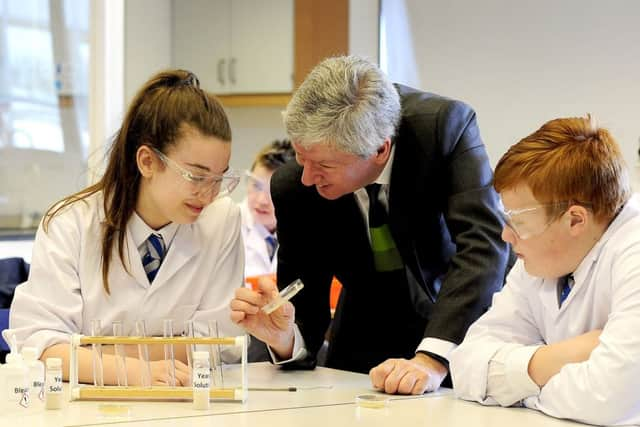Schools' plan forautism seeks to'˜stay local' in a changing world


But, says education chief David Mackay, that’s at least partly due to the fact that many people tend to say little about proposed changes unless they have substantial objections.
Autism (which covers a broad spectrum) is a complex area, but the council perspective is that in almost all cases the best approach is to keep children in their own area and community.
Advertisement
Hide AdAdvertisement
Hide AdNow it is set to put these ideas into practice with a Closer to Home Strategy that carries a price tag of £369,000 for the year 2017-2018.


It means keeping children in mainstream classes wherever possible, with additional specialist needs classes where required.
“Children who would have been perhaps badly treated in the distant past are individuals with their own particular needs,” says Mr Mackay.
“The idea of introducing enhanced provision for autistic services to local schools is in tune with Curriculum for Excellence – and has nothing to do with cost-cutting, as sometimes claimed.
Advertisement
Hide AdAdvertisement
Hide Ad“In fact we’re committed to this greater spending exactly so that we can be sure we are doing best for all children in our schools.


“We’re getting great support from head teachers too – there’s a buzz about teaching in Falkirk, as we work to continually improve what we are doing in schools.”
A new policy was needed simply because the number of children with additional support needs has grown locally, in line with a national trend.
Part of this is because modern education identifies “needs” whereas in days gone by children were often simply dismissed as “problems”.
Advertisement
Hide AdAdvertisement
Hide AdSo far, the concept of keeping children who have additional support needs in mainstream classes wherever possible appears to be gaining traction with parents.
Some remain unconvinced, and Mr Mackay accepts there’s further work to be done to persuade them otherwise.
But he insists where there have been objections, or points that demand an answer, for example whether there will be sufficient trained staff, the council genuinely seeks to find the “right” answer.
It’s implicit that as the scheme evolves it will continue to adapt by degrees to meet specific challenges.
Advertisement
Hide AdAdvertisement
Hide Ad“We need to be in partnership with parents, just as teachers can no longer ‘teach by rote’ as was the case years ago,” said Mr Mackay.
“What it comes down to is that we feel children are almost always going to do better in their own local school, in the area they know best.”
There is a mass of detail in the council report on the initiative which seeks to answer concerns about the practicality of various elements of the scheme - but a recurring theme is that the council is concentrating on “the child” rather than just children.
Everyone is important, it suggests – no child is excluded.
David Mackay says HMI school inspectors are a sound benchmark for whether his department is getting things right, and says he’d welcome “walk in” visits over the present system - which gives three week’s notice of an inspection tour.
Advertisement
Hide AdAdvertisement
Hide AdHe makes clear this is because he expects schools to be functioning at optimum efficiency on any given day, so that no particular day should be more special than any other.
At the same time he is clearly proud of what he sees as steady improvements across the board, and the Closer to Home Strategy is part of that.
It’s a key element of a wider local education advance, he suggests, not the answer to a dilemma. Last year Scotland’s then chief education inspector, Bill Maxwell, flagged up “outstanding innovative practice” across all areas of education during the launch of a key education report at Larbert High School.
He also highlighted aspects which need to be improved, but stressed the importance of high quality leadership
Advertisement
Hide AdAdvertisement
Hide Adin the effort to achieve the national ambition of ensuring all learners can reach their potential, regardless of their background.
The significance of that high profile visit to a local school to deliver a national message has not been lost on Falkirk Council. Curriculum for Excellence is an approach to education wildly different from the standard practice of generations past, and miles away from the old insistence on meeting pre-set and specific targets in every case.
Arguments over its implementation continue, but in Falkirk the Closer to Home strategy on autism spectrum disorder is seen as much more than just a bolt-on to the service. How it works in practice remains to be evaluated at a future date.